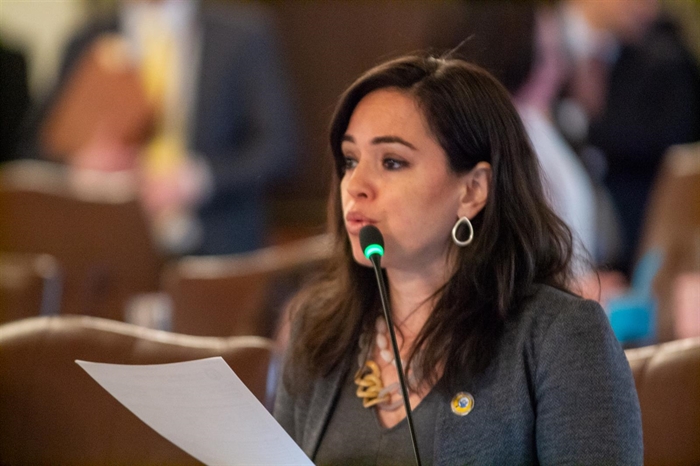Lawmakers advance bills mandating salary transparency, community college credit parity

SPRINGFIELD – As the General Assembly prepares to wrap up its spring legislative session this week, Democratic lawmakers are advancing a bill that would mandate job postings to include a salary range in a move they say would promote equity within the workplace.
Meanwhile, a bipartisan bill designed to make transferring to a public university in Illinois from a community college an easier and more cost-effective path will soon be sent to Gov. JB Pritzker for his signature.
Salary transparency
Democrats in the Illinois Senate last week approved a measure that would require employers to list a pay scale and expected benefits for any position listed on a job posting. It would also create a regulatory structure for the Department of Labor to investigate violations of the proposed law.
“We know that more and more employers have begun to include these pay ranges in their job postings as it becomes starkly clear that doing so is crucial to attracting talent,” bill sponsor Sen. Cristina Pacione-Zayas, D-Chicago, said in debate last week.
Pacione-Zayas said the bill would prompt employers to interrogate potential “unjustified disparities” between employees’ pay based on things like race, ethnicity, gender or language.
House Bill 3129 passed with a 35-19 vote. Because it was amended in the Senate, it now goes back to the House for consideration.
The bill would require expected pay disclosures from employers with 15 or more employees in the state and would apply to things such as job board listings, newspaper ads and postings made by a third-party on behalf of an employer.
Sen. Win Stoller, R-East Peoria, called the proposal “divorced from reality,” noting the bill does not account for the unpredictable hiring process.
“As a small business owner myself, we’ve had situations where we find the right person and we’ll restructure a department,” Stoller said. “We’ll rearrange some roles to take into full account, to take full advantage of their skills and abilities.”
Business groups opposed the bill when it was introduced, although that opposition has lessened. While amendments have brought powerful groups like the Illinois Manufacturers’ Association and Chicagoland Chamber of Commerce to neutral positions on the bill, the National Federation of Independent Businesses and the Technology Manufacturers Association opposed the bill in a House committee Tuesday morning.
If the bill becomes law, Illinois would join a growing number of states considering ways to make compensation more transparent in the job application process. New York passed a law last year that requires all job postings include a minimum and maximum salary or wage. Colorado passed a similar law that requires disclosing pay range and a general description of benefits in 2019. Some states, such as California, Nevada, Maryland and Rhode Island, require employers to disclose pay ranges to job applicants on request.
The salary transparency bill follows similar efforts in recent years aimed at making hiring practices more equitable, including a 2019 law that made it illegal for employers to ask about an applicant’s salary history as part of the interview process.
Community college credit parity
Under a bill soon to be sent to Pritzker’s desk, community college students in Illinois would be assured that class credits related to their chosen major in certain fields of study will be transferable to all public colleges and universities in the state.
Senate Bill 2288 passed the House on a unanimous vote last week after receiving the same chamber-wide support in the Senate in March.
Under current state law, four-year colleges and universities in Illinois can decide whether to accept community college course credits as direct equivalents to required classes in a transfer student’s declared major. If the university deems the community college class as not equivalent to the one it offers, the credits earned would only count toward a student’s elective hour requirements, and he or she would have to retake a similar class at the university.
Illinois Community College Board Director Brian Durham praised the bill’s House passage in a statement Monday.
“Equalizing the value for certain credits earned at community colleges will also help reduce the stigma that work done at a community college is less valuable than at a four-year college or university,” he said.
Under the Illinois Articulation Initiative – a partnership between the Community College Board and the Illinois Board of Higher Education – there are currently 18 majors in which courses taken at a community college may be counted as equivalent classes at a state university.
SB 2288 would grant course parity under all 18 of those majors, which are in areas from computer science to theatre arts. But the bill would also require the IAI to develop an equivalency plan for elementary and secondary education majors; early childhood education is already covered.
Proponents of the bill say the development of the education major equivalency plan will help Illinois address its teacher shortage.
Upon the governor’s signature, the law would go into effect on Jan. 1.
Miss Clipping Out Stories to Save for Later?
Click the Purchase Story button below to order a print of this story. We will print it for you on matte photo paper to keep forever.

